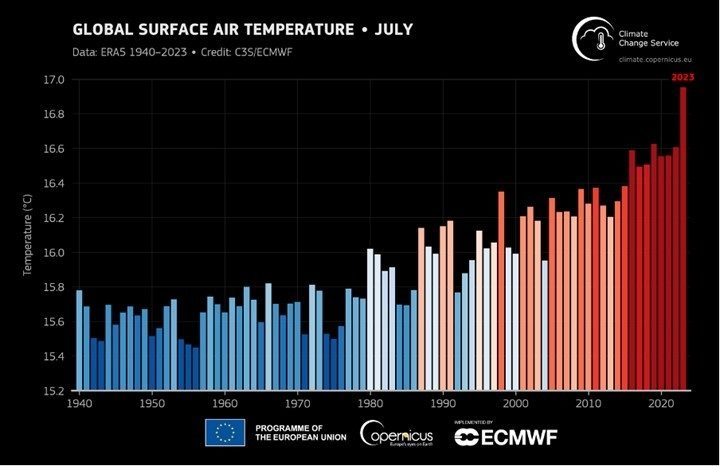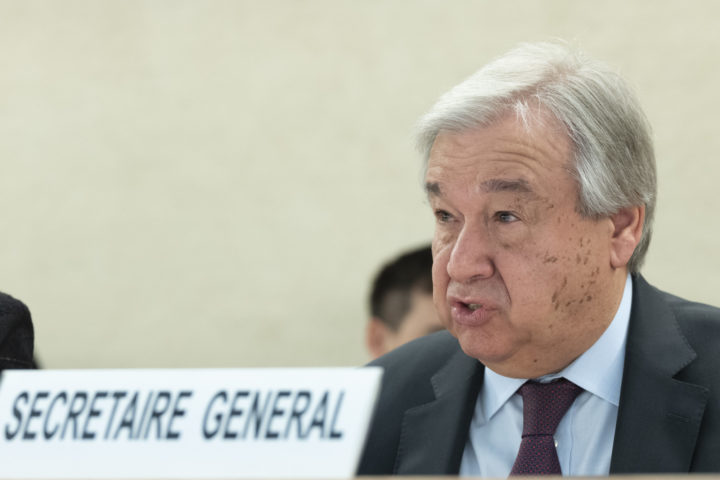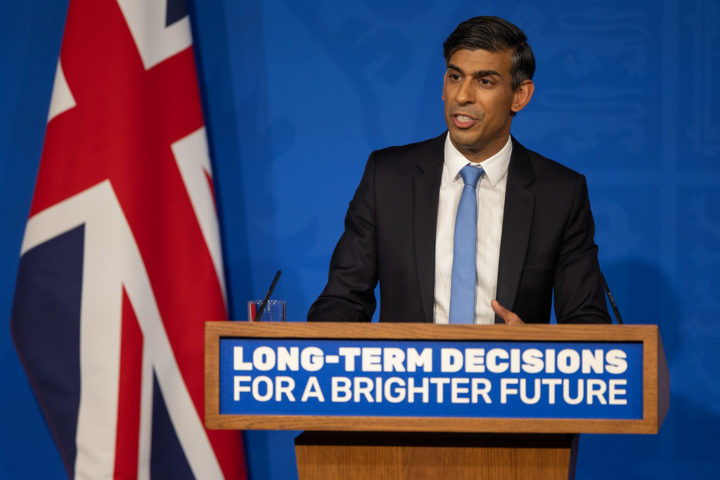The road to Dubai: three summits and a stocktake
The international meetings and moments that build towards the next UN climate summit - COP28 in the United Arab Emirates.

By Gareth Redmond-King
@gredmond76Share
Last updated:
The world has only a very few years left this decade to bring about a precipitous drop in emissions and get warming on track for 1.5°C, scientists at the Intergovernmental Panel on Climate Change (IPCC) have said. This year’s UN climate summit – COP28 in Dubai – will need to drive a dramatic change of pace to achieve that.
Various high-level talks between now and then are likely to set the scene for climate action in the years to come. In September alone, there have been three international summits and the launch of the UN’s first global stocktake – the most comprehensive look ever at climate action and progress towards the Paris Agreement.

These meetings are backdropped by a year of disasters. Storm Daniel flooding Libya, sweeping whole neighbourhoods to sea. Wildfires in Canada, Europe and Asia. A devastating blaze in Hawaii that engulfed the historical town of Luhaina. The hottest June on record, followed by the hottest month experienced by modern humans in July, and the hottest northern hemisphere summer ever. Ever-louder alarms from an increasingly unstable climate.
September
UN global stocktake
The UN’s global stocktake report is based on scientific and technical data and follows two years of consultations with governments, businesses and NGOs. The report landed in early September and is followed by ministerial meetings in October. It assesses action towards the Paris Agreement, adopted by 196 countries in 2015, and has at its core a pledge to limit warming to well below 2°C, aiming for no more than 1.5°C above pre-industrial levels. Since then, many nations – including the UK – have enshrined this pledge to get to net-zero by the middle of the century into law.
The report added to existing evidence that global efforts are still seriously lacking. Governments are failing to cut emissions fast enough, and the window for action is “rapidly narrowing”. Greenhouse gas emissions must peak by 2025 before falling off a cliff if there is a chance of keeping temperature rises to 1.5°C.
It makes clear that “phase out” of fossil fuels is key to achieving this. This is significant because in the past oil-producing nations have blocked any agreement using stronger terms than “phase down” and have usually limited references to coal. 80 nations at COP27, including the US, India and the EU, unsuccessfully sought agreement to language on phasing down all fossil fuels.

COP28 President-Designate, Sultan Al Jaber has tiptoed around language on oil and gas, preferring to talk up renewables. Jaber is both chairman of the Abu Dhabi National Oil Company and founder of renewable energy firm Masdar. Putting him at the helm of a COP that most agrees needs to address fossil fuel phase-out has sparked protests. The United Arab Emirates (UAE) is expanding oil production even as it calls on the rest of the world to make cuts, and committing much more investment to fossil fuel exploration than to renewables.
But a crucial part of the global stocktake report, key finding 6, sets Al-the agenda for COP28: “Achieving net zero CO2 and greenhouse gas emissions requires systems transformations across all sectors and contexts, including scaling up renewable energy while phasing out all unabated fossil fuels, ending deforestation, reducing non-CO2 emissions and implementing both supply and demand side measures.”
It remains to be seen whether the small but mighty word “out” will feature in the final deal in Dubai. Meanwhile, carbon dioxide in the atmosphere is still rising and expected to overshoot limits for 1.5°C by 22bn tonnes in 2030.
Achieving 1.5°C requires systemic change, overhauling global finances and ending behemoth fossil fuel subsidies. But both the UN stocktake and the IPCC are clear it is possible, and we have the tools we need to halve emissions this decade.
Africa Climate Summit

African leaders called for global carbon taxes and debt relief at the continent’s first climate summit held from the 4-6 of September. Africa is responsible for less than ten percent of greenhouse gas emissions but African nations disproportionately suffer the impacts of climate change; many are amongst the poorest nations on the planet.
A drought in the Horn of Africa, the worst in 40 years, increased in severity because of human induced climate change. 100 million people are affected and 20 million are on the brink of famine. Further north, more than 11,300 have died in floods in Libya. The magnitude of the loss is in part down to preparedness and slow response. The debt relief, climate finance and assistance with loss and damage that African leaders are asking for is to enable them to devote money to improve readiness, and adapt to the climate crisis, without having to divert scarce funds away from public services.
The summit ended with the Nairobi declaration, which had a heavy focus on finance. COP28 hosts UAE have pledged £3.5 bn to boost renewable energy on the continent. The issue of money for countries in the eye of the storm will feature in discussions in November – not least as wealthy nations have still not yet delivered on a three-year-overdue commitment of $100bn a year in climate finance for developing nations.
UNGA 78
The 78th meeting of the United Nations General Assembly (UNGA) began on the 5th September. It was a chance for Governments to begin making climate commitments ahead of COP, but is otherwise toothless; an opportunity for leaders to have 15 minutes at the podium rather than make decisions.
Climate Ambition Summit
However, on 20th September, UNGA included a summit, hosted by UN Secretary General António Guterres, welcoming “movers and doers.” Like a greenwashing bouncer, he has been clear that if your aim’s not down, then you’re not coming in – that he won’t host major emitters that haven’t worked hard on updating and strengthening their climate commitments.

At the summit, Guterres directed his ire at wealthy nations and the fossil fuel industry, saying humanity had “opened the gates to hell,” with worsening floods, droughts and wildfires. He added that we are “decades behind” on achieving net zero and rich countries must get there close to 2040.
UK PM Rishi Sunak was notably absent, preferring to stay in London watering down Britain’s net zero policies; plunging credibility for a nation that has formerly taken a lead on climate and doing nothing for his popularity among voters (with 40% deeming him ‘untrustworthy’) who consistently support climate action.
By contrast, London Mayor Sadiq Khan was in New York, expressing his dismay at “the poorest and most vulnerable bearing the brunt” of climate impacts, but adding that cities offer hope as the place where leaders are willing to make changes.
G20 leaders summit
Sunak foreshadowed his chaotic bonfire of policies at the G20 summit in India when he said he would reject “hairshirt” approaches to meet net zero. The summit was held from the 9th -10th September in New Delhi. China’s Xi Jinping and Russia’s Putin were no-shows (the latter unable to travel outside Russia without risking arrest), so the first and fourth most polluting countries were absent.
In the aftermath, it was widely criticised by observers as having achieved little on climate beyond a general commitment to ramping up renewables. Meanwhile, G20 governments handed out more than $1 tn in fossil fuel subsidies in 2022, according to the International Institute for Sustainable Development (IISD).
New York Climate Week
Overlapping various of these, a week of climate action in New York kicked off with major protests outside Blackrock and Citibank on 14th September calling for an end to investment in fossil fuels and culminated in a March to End Fossil Fuels on 17th September. The march, led by Democrat Congresswoman Alexandria Ocasio-Cortez, drew an estimated 50,000-75,000 activists, making it the biggest climate march in the US in five years.
October
Party conferences
It may be the last party conferences before the next general election, with net zero expected to be front and centre. After the LibDems, the Conservatives are in Manchester from 1-4th October, with Labour in Liverpool a week later – 8-11th October.

Since the Conservatives narrowly avoided losing the Uxbridge and Ruislip by-election, campaigning against the Mayor’s extension of London’s low emissions zone (ULEZ), there has been disarray in the party’s approach to net zero. Despite ULEZ being about clean air, not carbon emissions, the unexpected win (by just 495 votes) appears to have convinced some Conservatives an anti-net zero culture war could yet keep them in the running for a general election. But polling shows 70% of UK voters back a net zero target, and the public are actually embarrassed by parties that renege on their green commitments. The chaos has drawn condemnation from business leaders, with car manufacturers and energy suppliers saying political flip-flopping has brought turmoil to their industries and undercuts investment in the UK.
Meanwhile opposition leader, Keir Starmer is planning a green industrial revolution modelled on Biden’s Inflation Reduction Act. It’s pegged to involve cheaper cars, heating and energy, alongside jobs creation. The biggest question will be whether Starmer can hold his nerve even as net zero is plagued by misinformation and culture war narratives.
November
COP28

All of which is on the road to COP28 (30th November – 12th December).
We’re knee-deep in the build up with high-profile meetings, the biggest climate protest in the US in years, Guterres gunning for green-washers, and net zero taking centre stage in British electioneering. As floods, droughts and fires worsen, and the window for action closes, and as populist governments stir conflict over climate action, the outcome of this year’s COP could be one of the most critical yet.
Share